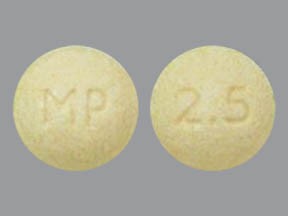MECAMYLAMINE - ORAL
PHONETIC PRONUNCIATION: (MEK-a-MIL-a-meen)
COMMON BRAND NAME(S): Vecamyl
GENERIC NAME(S): mecamylamine HCl
Uses
USES: Mecamylamine is used to treat moderately severe to severe high blood pressure. It can also be used in sudden high blood pressure emergencies (malignant hypertension). Lowering high blood pressure helps prevent strokes, heart attacks, and kidney problems. Mecamylamine belongs to a class of drugs known as ganglion blockers. It works by relaxing blood vessels so blood can flow more easily.
How to use MECAMYLAMINE - ORAL
HOW TO USE: Take this medication by mouth as directed by your doctor, usually 2 to 3 times daily. You may take this medication with or without food, but it is important to choose one way and take this medication the same way with every dose. The dosage is based on your medical condition and response to treatment. To reduce your risk of side effects, your doctor may direct you to start this medication at a low dose and gradually increase your dose. Follow your doctor's instructions carefully. Take this medication regularly to get the most benefit from it. To help you remember, take it at the same times each day. It is important to continue taking this medication even if you feel well. Most people with high blood pressure do not feel sick. Do not stop taking this medication without consulting your doctor. A rapid rise in blood pressure may occur when this drug is suddenly stopped. This rapid rise in blood pressure may lead to stroke or heart failure that can be severe (possibly fatal). To prevent your blood pressure from getting too high if you are stopping treatment with this drug, your doctor may reduce your dose gradually and start you on another medication. Consult your doctor or pharmacist for more details. Report any new or worsening symptoms right away. It is important that you do not run out of mecamylamine or miss any doses. Tell your doctor or pharmacist right away if you are unable to take the medication (for example, due to vomiting). When this medication is used for a long time, it may not work as well. Talk with your doctor if this medication stops working well. Tell your doctor if your condition does not improve or if it worsens (for example, your blood pressure readings remain high or increase).
Side Effects
Precautions
Interactions
Overdose
Images
Reviews
Faq for MECAMYLAMINE - ORAL
Mecamylamine is an oral medication that belongs to the class of drugs known as ganglionic blockers. It is used to treat high blood pressure by relaxing and widening blood vessels.
Mecamylamine works by blocking the transmission of certain nerve signals between the ganglia, which helps to relax and widen your blood vessels. This leads to a decrease in blood pressure.
Common side effects of Mecamylamine may include dizziness, nausea, diarrhea, headache, constipation, dry mouth, fatigue, and weakness. It is important to report any severe or persistent side effects to your doctor.
The recommended dosage of Mecamylamine will vary depending on your medical condition, response to treatment, and other medications you may be taking. It is important to follow your doctor's instructions and take the medication as prescribed.
Mecamylamine may interact with other medications, including certain antidepressants, antacids, anti-seizure drugs, and medications for Parkinson's disease. It is important to inform your doctor about all the medications you are currently taking to avoid any potential drug interactions.
Mecamylamine is not recommended for use during pregnancy as it may harm the unborn baby. It is also not known whether this medication passes into breast milk, so it is recommended to consult with your doctor before using Mecamylamine while breastfeeding.
The effects of Mecamylamine may take several weeks to become noticeable. It is important to continue taking the medication as prescribed, even if you do not immediately feel the benefits.
No, Mecamylamine should not be stopped abruptly. Consult your doctor before discontinuing the medication, as it may need to be gradually tapered off to avoid withdrawal symptoms or an increase in blood pressure.
If you miss a dose of Mecamylamine, take it as soon as you remember. However, if it is close to your next scheduled dose, skip the missed dose and resume your regular dosing schedule. Do not double the dose to make up for a missed one.
No, Mecamylamine is not considered to be physically or psychologically addictive. However, it is important to take the medication as directed by your doctor and not exceed the prescribed dosage.
Disclaimer
IMPORTANT: HOW TO USE THIS INFORMATION: This is a summary and does NOT have all possible information about this product. This information does not assure that this product is safe, effective, or appropriate for you. This information is not individual medical advice and does not substitute for the advice of your health care professional. Always ask your health care professional for complete information about this product and your specific health needs.

No Reviews Yet